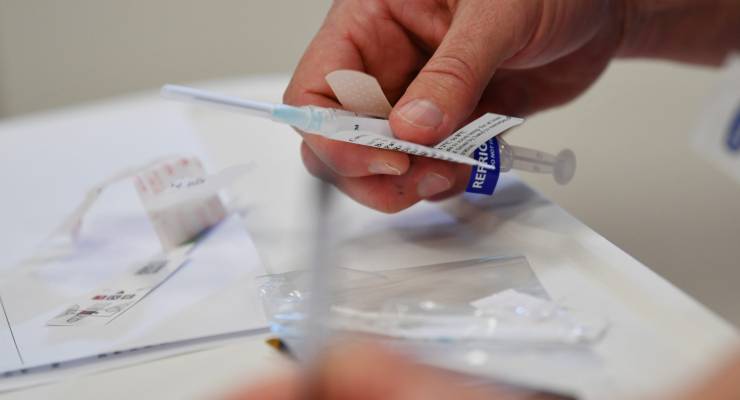
The University of Queensland and CSL have abandoned phase two and three trials of their COVID-19 vaccine after trial participants returned false positives for HIV.
Although there is no possibility the vaccine causes HIV infections, the changes that would need to be made to current procedures to support the vaccine’s rollout were considered too great. The false positives could also deter people from getting a COVID-19 shot.
What happened?
The vaccine was being tested on 216 participants and trials showed it was safe and effective. It uses an HIV protein — specifically the HIV-1 GP 41 protein — as the molecular clamp.
Sydney University infectious disease expert Professor Robert Booy tells Crikey this clamp keeps the virus in a form that the human body can identify as foreign and fight — producing antibodies to prevent infection.
“The molecular clamp approach has been used successfully to make antibodies against influenza, HIV and ebola,” he said.
But this protein has interfered with HIV screening tests, causing several participants to return a false-positive HIV result. The risk of this happening was known but was thought to be very low.
Yesterday the vaccine makers met the government and decided not to continue with the trials.
Could this happen to other vaccine candidates?
Australia now has agreements with three vaccine candidates — Pfizer, AstraZeneca and Novavax — and is monitoring 10 others to be included in the COVAX facility, an alliance that Australia invests in to allow it to buy vaccine doses as they come available.
UQ, Novavax and Clover Biopharmaceuticals’ candidates are all protein subunit vaccines which use part of a pathogen instead of the whole cell to deliver inactivated parts of the SARS-COVID-19 virus to produce an immune response.
UQ’s vaccine was unique in using the patented molecular clamp technology, which relied on the HIV protein.
Although HIV false positives aren’t likely to occur in the other vaccines, Booy says there was always a chance more could get taken out of the race.
“Every vaccine has had a hiccup,” he said. “In trials there will always be one or two people who develop a serious adverse event which is probably not related to the vaccine.”
What next?
UQ received an initial investment of up to US$4.5 million by the Coalition for Epidemic Preparedness Innovations, in Oslo.
The Morrison government had also signed a deal with the university worth up to $1 billion for more than 51 million doses but will divert that to increasing its orders with other candidates. An extra 20 million doses of the AstraZeneca vaccine and 11 million of Novavax have since been ordered.
Although there is a possibility that UQ alters its vaccine to remove the HIV protein, it isn’t likely. In a press conference this morning UQ vaccine co-lead Professor Paul Young said the team didn’t have the luxury of time.
“Doing so would set back development by another 12 or so months, and while this is a tough decision to take, the urgent need for a vaccine has to be everyone’s priority,” he said.








And did you notice that the Pfizer vaccine has not been trialed on pregnant or breastfeeding mothers? Hence, the recommendation in the UK is that pregnant and breastfeeding women don’t vaccinate. A good example of women and children go last; something the pandemic is exemplifying. It’s also a nice incentive to get mothers weaning their babies prematurely to get vaccinated….particularly nice for infant formula companies, like Pfizer!
Can someone explain this to me: if the vaccine can cause antibodies to HIV, isn’t it then acting in some sense as a vaccine against HIV? If the answer is yes, is this a bad thing, or an unexpected bonus?
I listened to the commentary through the afternoon, and thought I detected a whiff of political interference.